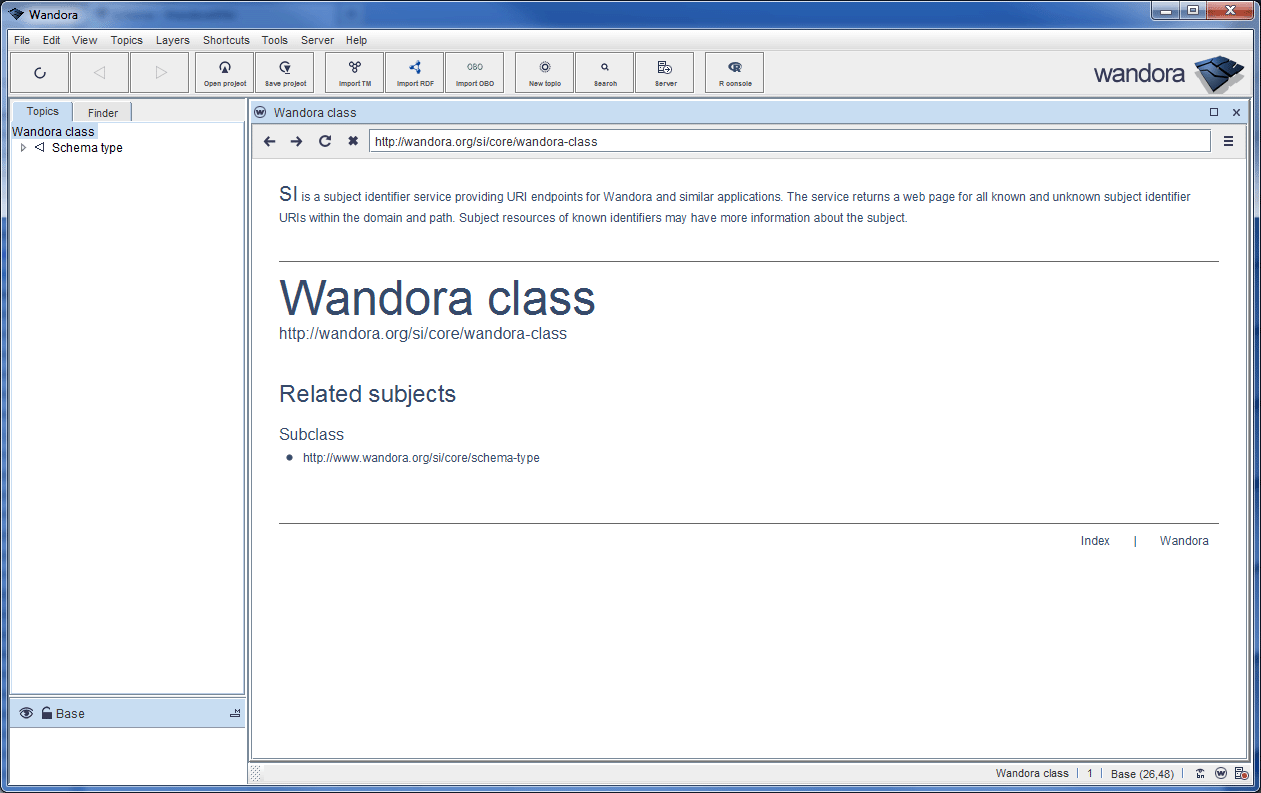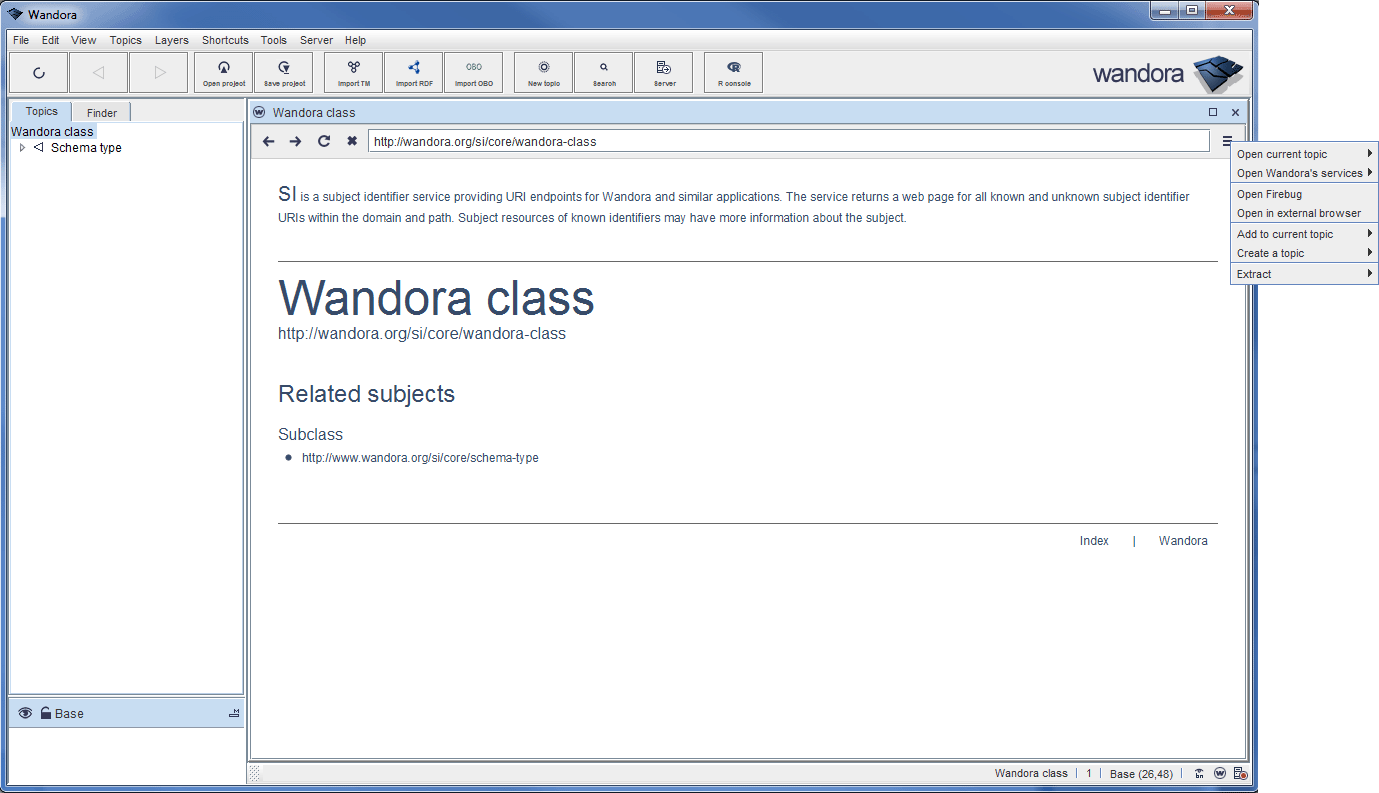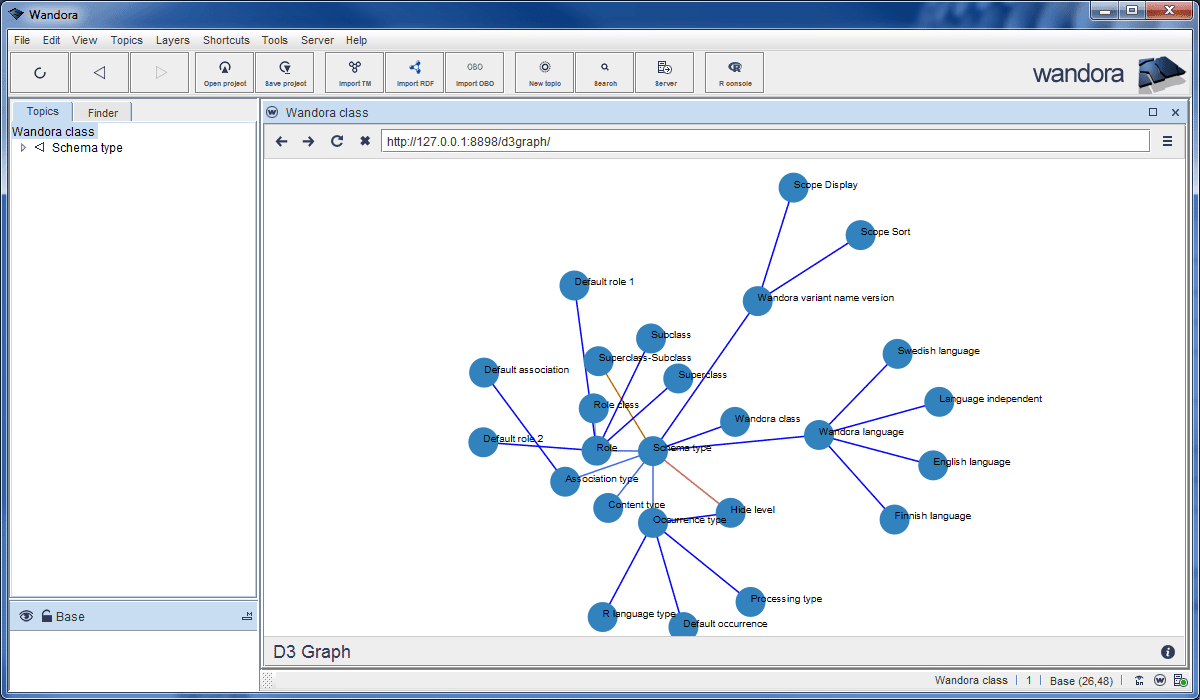Webview
(→Open Wandora's services) |
(→Open Wandora's services) |
||
| Line 37: | Line 37: | ||
=== Open Wandora's services === | === Open Wandora's services === | ||
| − | Wandora features [[Embedded_HTTP_server|embedded HTTP server]] that hosts numerous services. Previously the user has used these services with external WWW browser only. Now these services can be viewed inside the Wandora application too. The submenu contains a list of available services and selecting a service in the list opens it to the Webview. | + | Wandora features [[Embedded_HTTP_server|embedded HTTP server]] that hosts numerous services. Previously the user has used these services with external WWW browser only. Now these services can be viewed inside the Wandora application too. The submenu contains a list of available services and selecting a service in the list opens it to the Webview. Next image views a [[D3_graph_service_module|D3 graph service module]] open in Webview. The graph is interactive as it were viewed in the external WWW browser. |
| + | |||
| + | |||
| + | [[File:webview d3graph.gif|center]] | ||
| + | |||
| + | |||
| + | At the moment Wandora features 26 different services in the embedded server. Some are visualizations that work nicely in the Webview panel. Some are plain data feeds (XTM, RDF) that are not very visual. And some don't work on Webview at all. For example, [[Flash graph service module]] doesn't work on Webview as Webview doesn't support Flash. Next image views options found under the Open Wandora's services menu option. It is more than likely that the collection of available services evolves in upcoming Wandora releases. | ||
[[File:webview_menu_view_services.gif|center]] | [[File:webview_menu_view_services.gif|center]] | ||
Revision as of 16:14, 11 April 2014
Webview is not part of Wandora application yet. It will be published in 2014-04-15.
Webview is a full featured web browser embedded into the Wandora application. Webview uses the WebView component of the JavaFX framework. To add a Webview panel select menu option View > Add topic panel > Webview. By default, the Webview opens arbitrary subject identifier as the Webview location. Next screen capture views Webview with Wandora class topic. The location field contains topic's subject identifier http://wandora.org/si/core/wandora-class.
Webview's title bar views the name of current topic. Current topic doesn't change if the user changes manually the URL in location field. For example, the user can change the location to http://wandora.org/www/ and current topic stays Wandora class. Next screen capture views the Wandora after location change.
The icons to the left of location field are navigation arrows, reload and stop button for the Webview. Navigation arrows can be used to restore previous and next web location. Notice, Wandora has also topic navigation arrows on the top bar of application window. Webview's navigation arrows work with Webview's navigation history as the topic navigation arrows work with Wandora's topic navigation history. These histories overlap usually but are not identical if the user opens anything else but a topic in the Webview. Reload icon views an arrow circle. It is used to reload the content of current Webview location. Stop icon is cross-shaped and removes the current page in Webview. Removing a page in Webview may be necessary if the page contains defective Javascript code, for example.
To the right of Webview's URL field is an icon with three short horizontal lines. It opens up a menu with Webview specific tools. Next screen capture views the Webview tool menu open.
Webview tools
Pressing an icon right to the Webview's URL field reveals a menu that contains Webview tools. Next chapters describe the tools found in the menu.
Open current topic
This submenu lists all subject identifiers, occurrences and subject locator of the current topic. As the Webview opens an arbitrary subject identifier of a topic, the user can choose to open any other subject or occurrence of the topic with the options in the submenu. Selecting submenu item opens the subject or occurrence URI to the Webview. Also, Webview can view occurrences that are not URLs but plain of HTML text. For example, occurrence may contain a complete HTML page source after a document extraction. Viewing the occurrence in Webview views the page as it was looked from the original URL location.
Next image views the Open current topic submenu of Wandora class topic. Submenu options depend on topic and it's subjects and occurrences.
Open Wandora's services
Wandora features embedded HTTP server that hosts numerous services. Previously the user has used these services with external WWW browser only. Now these services can be viewed inside the Wandora application too. The submenu contains a list of available services and selecting a service in the list opens it to the Webview. Next image views a D3 graph service module open in Webview. The graph is interactive as it were viewed in the external WWW browser.
At the moment Wandora features 26 different services in the embedded server. Some are visualizations that work nicely in the Webview panel. Some are plain data feeds (XTM, RDF) that are not very visual. And some don't work on Webview at all. For example, Flash graph service module doesn't work on Webview as Webview doesn't support Flash. Next image views options found under the Open Wandora's services menu option. It is more than likely that the collection of available services evolves in upcoming Wandora releases.





